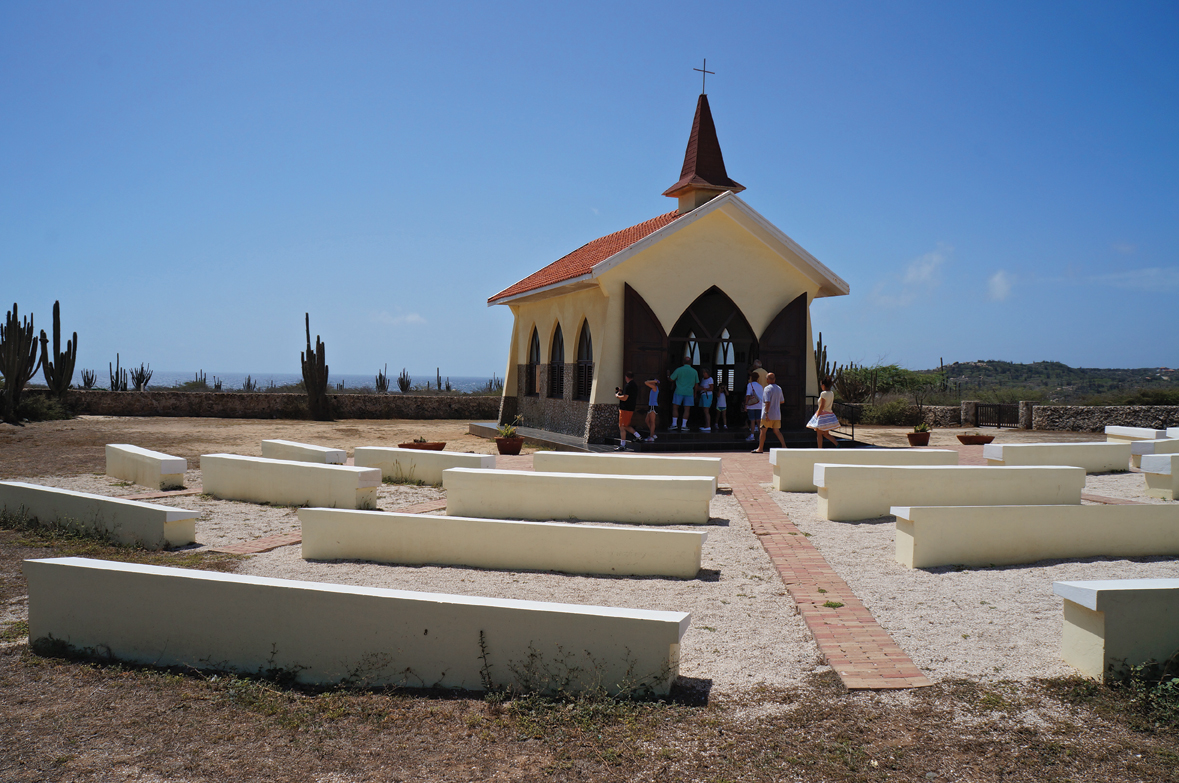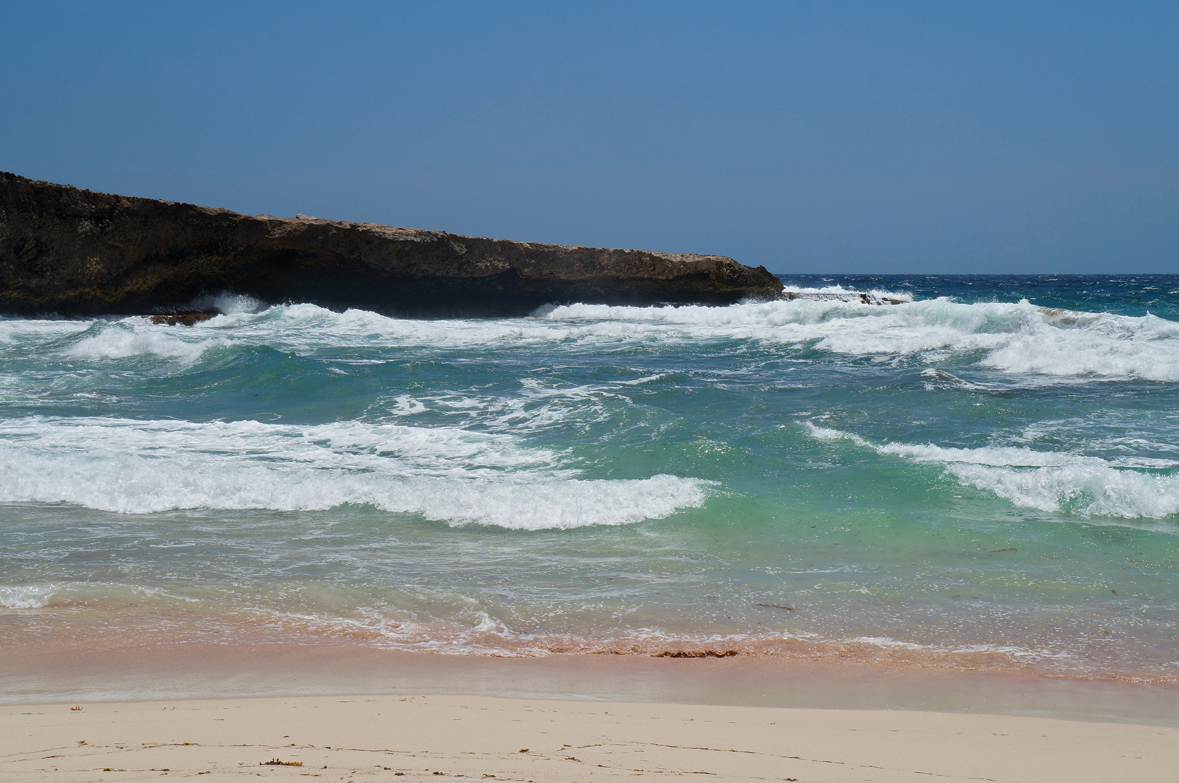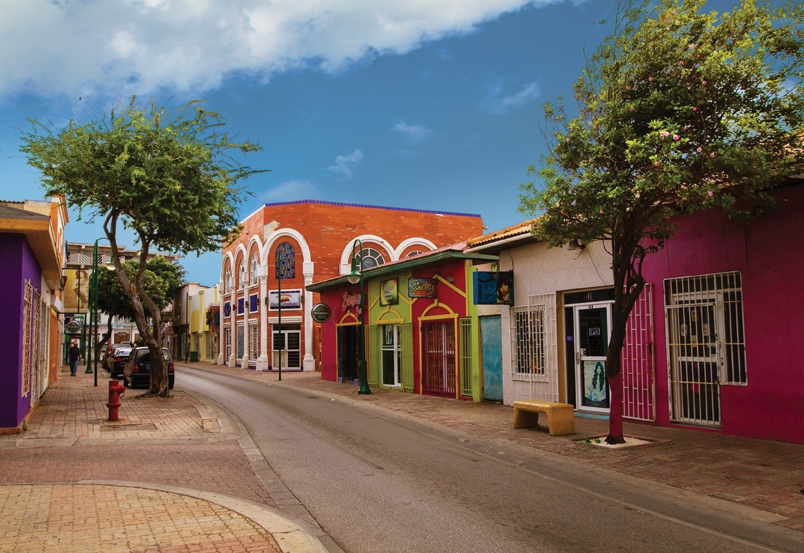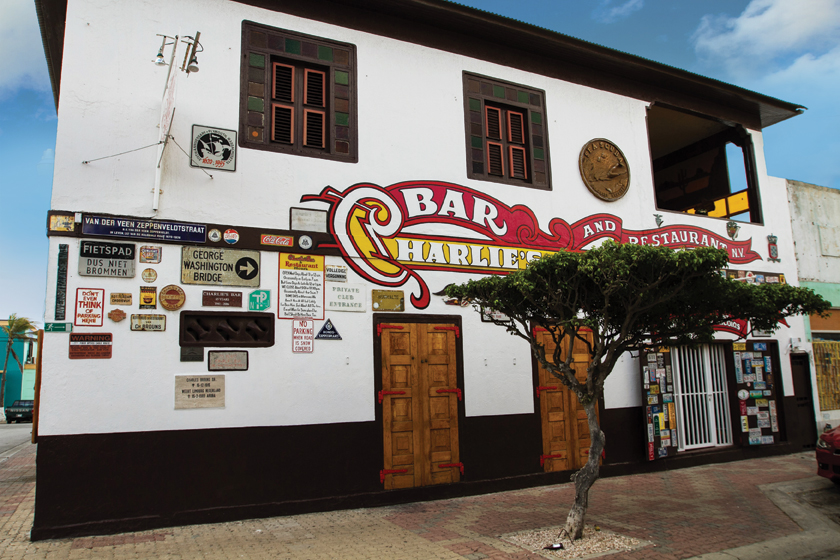The Desert – Paradise Beyond the Beach
Where are the giant lizards? That is the question you ask yourself when you leave Highway 1A after the louche refinery town of San Nicolas and begin to descend on a rutted road towards Baby Beach. You may think you’re on Aruba but it feels more like you have been transported to the set of a some long-lost Mexican sci-fi movie.
— By Timothy Dugdale
A long hill filled with scrub and cacti rolls towards a glistening sea of breakers. Off to the right is a massive defunct refinery belching ominous plumes of exhaust. Along the way, you encounter a tribe of goats snacking on the sun-blasted scrub with mindless industry.
This is the Aruba that awaits you when you venture outside the frame of package tourism that has sustained this island for so long. The contrast is stark and mysterious. Gucci and Givenchy have no currency here, nor do the tabloid demises of hapless American holiday makers like Natalee Holloway and Robyn Gardner.
Aruba is a desert island born of a volcano and the desert is the real show. It is much more an escape hatch from the beach’s tyranny of youth culture and the sun-blasted hordes shambling from one shopping plaza to the next. The desert is the spiritual heart of Aruba.
Look at the sky and you can see why Aruba’s arid land gave it a unique historical kink in the Caribbean. The clouds race past, rarely able to drop any payload they carry. Without rain, you can’t grow enough crops to merit building a plantation. If you don’t have a plantation, you don’t need slaves. If a Dutch filmmaker thought to shoot a historical drama set during the Boer War with Aruba standing in for South Africa, he’d be hard-pressed to find stand-ins for Zulus. There are, however, plenty of swaggering Latin bucks with busy cellphones and zaftig Latinas in sequined jeans and pink baseball caps.
At the beach, with a drink in your hand, you can say the breeze rustles the palms. In the desert, it’s a bona fide wind that buffets the cacti. Only a few kilometres north of Baby Beach, at the terminus of Arikok National Park’s main road, is Boca Prins. This is arguably the most beautiful desert locale in Aruba. As you crest the hill, you will see a sentry of large windmills turning in the fury of the coastal wind. You park on a moonscape of shrub and parched limestone. At the end of a path, there is a set of stairs leading to a small beach. Turquoise rollers pound the bay. The sea will eat you alive here. It is not a place to celebrate your love dressed in white or another successful stint in rehab. This is real nature, ancient and remorseless. This is the Aruba that welcomed the Arawak Indians thousands of years ago as they sought refuge from the savage Caribs.
Leaving Boca Prins, you can drive south, past the windmills, towards San Nicolas. Strange flora and fauna of a different and more expensive kind await you there, especially after dark. San Nicolas is a strange, forlorn place that once thrived when the Valero refinery was alive. It is a town that for many years welcomed a fair share of scoundrels riding dubious cross-currents of 20th century Caribbean history. Tourists are scarce now and the red light district, the only place where prostitution is legal in Aruba, is often shuttered. Behind the refinery is a ghost town of company houses that are slowly being reclaimed. Don’t miss this place if you want the full Aruba experience.
Or you can leave Arikok National Park through the main entrance and eat some dust on Highway 6 to Highway 3 as you head north. When you arrive in Noord, take the road leading to Alto Vista. The road winds and climbs, arriving at a small clapboard chapel encircled with stone pews. The interior is simple with votive candles near an altar that features a large wooden carving of the Virgin Mary. To the side of the chapel are a number of dirt roads that lead down to the open sea. Enjoy a moment of reflection in the church before doing the same at the edge of the sea. This pilgrimage is a stirring and profound experience, regardless of your faith or lack thereof.
In a world that seems to have gone insane with shopping and strife, people need beauty and sanctuary more than ever. In the desert of Aruba you can find both. Aruba could be a compelling desert destination like Santa Fe or Sedona, with art galleries, spas and restaurants featuring local cuisine from local sources. With a savvy long-range strategy of agricultural sustainability and progressive waste management, Aruba might succeed in bringing the well-heeled to the desert without destroying the desert.
For now, though, the desert belongs to the spiritual seeker on a budget. When I was much younger, I lived in Brazil. To get to a great hippie beach, we would take an overnight bus from Belo Horizonte to Porto Seguro. In the middle of the night, the bus would stop in some godforsaken town deep in the outback where there was only a restaurant and a small hotel. That is how you feel when you arrive at the Coconut Inn, with Ling’s Bar & Restaurant steps away. Even though only a few blocks from the madness of the high-rise hotel district, you feel hundreds of miles away. The Coconut Inn is a quiet, beautifully managed family motel with improbably fluttering palms throughout the courtyard and around the small pool. The dining room looks like something from an old Miami hotel of the 50’s with gorgeous wood and a shapely mid-century bar design. I asked the cook why they didn’t serve drinks.
“Don’t talk to me about it,” he said, offering a rueful smile. “I used to cook great dinners here. But people drank too much. Too many fights. Especially the women.”
For dinner and drinks, you could do worse than Ling’s Bar & Restaurant, only steps away. It exudes an alluring twilight quality, enhanced by the presence of the irrepressible Carlton Ling who might have left Hong Kong for Aruba thirty years ago but has the air of a man who still knows all its nooks and crannies. The Chinese food is never less than serviceable, the cumbia on the stereo is always hot and the beer is always cold. A late-night game of poker would be perfect in a place like this.
Walking back from Ling’s, you hear a pack of stray dogs bay at the moon. The stars are out. The desert is alive with its night music. This is the oasis that awaits those who reject the mirage on the other side of the highway.













